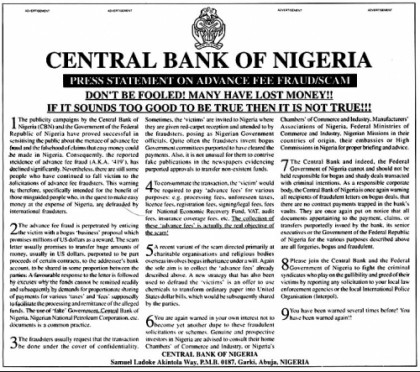 Over the last 15 years or so I have received perhaps as many as a dozen emails frantically explaining that I have millions of dollars waiting for me in Nigeria if only I would help some poor, benighted soul get his money out of a locked bank account. Usually the scam requires I provide my banking info so that funds can be transferred into my account. What the scammer hopes is that I am greedy or gullible enough to get involved…and then there will be complications that need some quick cash from me to bribe someone or pay for a transfer license, or some such expense.
Over the last 15 years or so I have received perhaps as many as a dozen emails frantically explaining that I have millions of dollars waiting for me in Nigeria if only I would help some poor, benighted soul get his money out of a locked bank account. Usually the scam requires I provide my banking info so that funds can be transferred into my account. What the scammer hopes is that I am greedy or gullible enough to get involved…and then there will be complications that need some quick cash from me to bribe someone or pay for a transfer license, or some such expense.
Of course I’ve never done it. And I bet neither have you.
Why haven’t we?
 Other than the obvious implausibility of the offer (“If it sounds too good to be true, then it is not true”), the other giveaway is the blatant incompetence of the presentation. The wording is always confusing. The grammar horrific. And the mere mention of Nigeria is a dead give-away that deviousness is afoot.
Other than the obvious implausibility of the offer (“If it sounds too good to be true, then it is not true”), the other giveaway is the blatant incompetence of the presentation. The wording is always confusing. The grammar horrific. And the mere mention of Nigeria is a dead give-away that deviousness is afoot.
The phishing emails are so bad, I have wondered how these scammers can be so stupid. Why are there no really clever spammers designing really clever phishing hooks?
I learned why today.
The scammer needs to decrease the number of false positive responses. Here’s how Prof. Geoffrey K. Pullum (linguistics, University of Edinburgh) explained it today on Language Log:
The answer is: to reduce the “victim density.” He has to make sure that only the most utterly gullible and stupid recipients will respond. If we all wrote back to the scammer and he had to try and correspond with millions of us to see if we were going to supply the details he wants, his work would be unending and his profit would shrink to nothing. Strange though it may seem, the scammer’s best interests are served if the email doing the phishing is ludicrously incompetent and transparently suspicious. He isn’t after you or me; he’s after the poor, lonely, gullible, housebound pensioner next door, the rare uninformed shut-in who has never heard of Nigerian scams and for whom the dream of a windfall will be attractive enough to justify handing over a bank account authorization password.
In other words, from the myriad emails sent out, the scammer wants only those respondents who offer the highest probability of success. And the unbelievably incompetent email is a sieve that encourages those of us who would only waste his time to pass through.
We chuckle at his stupidity…but he is actually being very clever.






One Comment on “Nigerian Scam Mathematics”
While Prof. Pullum’s speculation is an interesting and plausible explanation for some of the clumsiest email scams, I think there is an upper range of more sophisticated scams that are designed to fool any of us. In the past couple of years I’ve received a number of emails purporting to be from my bank, with very convincing logos, language, and links. Fortunately, my computer software gives me an early warning when something is phishy, and I forward the suspect email to my bank for confirmation. I can’t afford to be smug–with the right bait, I’m afraid a truly clever phisherman could catch almost any of us.
Back to your post, I first saw one of the Nigerian scams back in the early ‘nineties. I got a fax at work with a convoluted story about a coup and money in an offshore account. I’d never seen anything like it, and I showed it to my boss as something weird and funny. We laughed, and he said, “Give them a call.” So, I checked the time zones, figured it was the middle of the night in Nigeria, called, and had a brief conversation with a very sleepy man whose English skills were at the same level as those of the author of the fax.
Comments are closed.